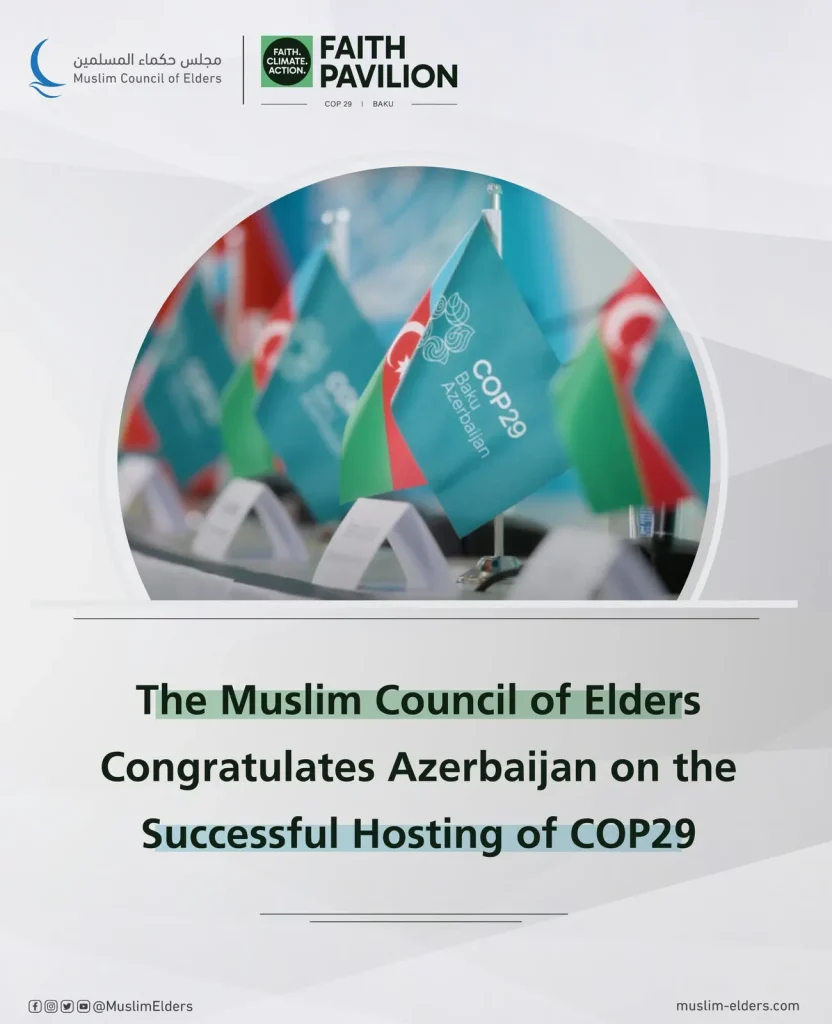The sessions held on Days 9 and 10 at the Faith Pavilion, organized by the Muslim Council of Elders at COP29 addressed a broad range of critical topics related to climate change and sustainable development. These included the role of spiritual and faith-based values in supporting global efforts to combat the climate crisis, the importance of integrating youth, women, and indigenous communities into global climate action, and the urgent need to develop climate-resilient cities and implement nature-based solutions to improve water quality and food security.
On Day 9, You Lin, Director of Fo Guang Shan New York Temple, emphasized that climate change and ecosystem destruction have become pressing global emergencies requiring concerted action to care for and sustain nature. She noted that environmental protection begins with individuals through pure thoughts and positive behavior and called for collective action to achieve sustainable development and ensure a better future for the planet and its resources for future generations.
Upendo Mwakyusa, Founder and Executive Director of The Call for Environmental Conservation (CFEC), delivered the youth address, highlighting the essential role of young people in combating climate change and building sustainable communities. She stressed the importance of focusing climate action on women, youth, and children, who are among the groups most vulnerable to climate challenges. She also emphasized that these groups should not only be seen as victims but also empowered to become part of effective climate solutions.
The first session, titled ‘Urbanization in Asia: Overcoming barriers and scaling urban Nature-based Solutions’ explored the challenges posed by rapid urban expansion in Asia amidst climate change. Participants noted that by mid-century, hundreds of coastal cities in Asia will face threats such as rising sea levels, extreme storms, and unsustainable urban practices. They highlighted the need for more climate-resilient cities by improving early warning systems, creating adaptation plans for extreme weather, and implementing nature-based solutions to improve water quality, reduce temperatures, and enhance food security.
The second session, ‘Processing the H.E.A.R.T’ discussed the importance of integrating spiritual values and ethical principles into global climate dialogues. Speakers emphasized the necessity of including voices from faith organizations, religious leaders, civil society, youth, and women in climate efforts. They called for ongoing dialogue between religious leaders and policymakers to ensure their perspectives are incorporated into climate policies, fostering environmental action within communities and spreading knowledge about climate change mitigation practices.
The third session, ‘Interfaith Dialogue on COP29 Stocktake and What is Needed for COP30’, underscored the urgency of joint multilateral efforts to address the global climate crisis. Participants highlighted the need to raise awareness within communities about the risks of climate change and emphasized the critical role of faith communities in advancing these efforts. They showcased effective environmental programs such as tree planting and renewable energy adoption.
The final session on Day 9,’African Experiences of Faith, Advocacy, Action, and Intergenerational Community Accompaniment for a Just Planet’ highlighted African initiatives combining faith, collective action, and community advocacy to address the climate crisis. Speakers stressed the importance of empowering communities with knowledge about climate impacts and solutions, including renewable energy adoption, sustainable land-use practices, climate-resilient infrastructure development, and comprehensive mitigation measures. They called for ambitious climate action to ensure a fair and sustainable future, particularly for vulnerable groups such as farmers and fishermen.
On Day 10, the session titled ‘Belief to Action: The Roles of Religious Leaders and Power of Faith-based Values on Planetary Health’ emphasized the central role of faith-based values in advancing efforts to combat climate change and achieve sustainable development. Participants discussed integrating religious and ethical teachings, such as simplicity and respect for life, into environmental policies to drive behavioral change and foster positive transformations at both individual and societal levels. They highlighted the ability of religious leaders to contribute to building a more sustainable and equitable future.
The Faith Pavilion at COP29 builds on the success of its inaugural edition at COP28, framing climate change as a profound religious and moral issue. It continues to explore best practices for promoting sustainable lifestyles, examining the non-economic impacts of climate change through faith-based perspectives, and urging global policymakers to consider the spiritual and ethical consequences of environmental neglect while taking decisive action to protect the planet.










